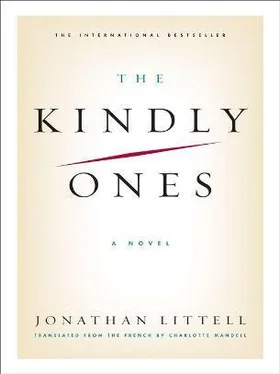Dinner passed in brief, constrained phrases, almost lost in the clicking of silverware and plates. Moreau complained about his business and about the Italians, and insisted pathetically on his good relations with the German economic administration in Paris. He tried to make conversation and I, on my side, politely, baited him with little aggressive jabs. “What is your rank there, on your uniform?” he asked me.—“SS-Sturmbannführer. It’s the same as a major, in your army.”—“Oh, a major, you’ve been promoted, that’s great—congratulations.” In return, I asked him where he had served, before June ’40; blind to the ridicule, he threw his arms up: “Oh, my boy! I would have liked to serve. But they didn’t take me, they said I was too old. Of course,” he hurried to add, “the Germans beat us fairly. And I completely approve of the Maréchal’s policy of collaboration.” My mother didn’t say anything; she followed this little game with alert eyes. The twins ate cheerfully; but from time to time their expression changed completely, as if a veil of gravity descended on them. “What about your Jewish friends? What’s their name? The Benahums, I think. What happened to them?” Moreau reddened. “They went away,” my mother replied curtly. “To Switzerland.”—“That must have been hard for your business,” I went on to Moreau. “You were partners, weren’t you?”—“I bought him out,” Moreau said.—“Oh, very good. At a Jewish price, or an Aryan price? I hope you didn’t let yourself be cheated.”—“That’s enough,” my mother said. “Aristide’s business has nothing to do with you. Tell us about your experiences. You were in Russia, weren’t you?”—“Yes,” I said, suddenly humiliated. “I went to fight Bolshevism.”—“Ah! Now that is praiseworthy,” Moreau remarked sententiously.—“Yes, but the Reds are advancing now,” my mother said.—“Oh, don’t worry!” Moreau exclaimed. “They won’t reach here.”—“We’ve had some setbacks,” I said. “But that’s temporary. We’re preparing new weapons. And we’ll crush them.”—“Excellent, excellent,” Moreau breathed, nodding his head. “I hope you’ll take care of the Italians, afterward.”—“The Italians have been our brothers in arms from the beginning,” I retorted. “When the new Europe is formed, they will be the first to have their share.” Moreau took this very seriously and got angry: “They’re cowards! They declared war on us when we were already beaten, so they could plunder us. But I’m sure Hitler will respect France’s integrity. They say he admires the Maréchal.” I shrugged my shoulders: “The Führer will treat France as it deserves.” Moreau grew red. “Max, that’s enough,” my mother said again. “Have some dessert.”
After dinner, my mother had me go up to her dressing room. It was a room that adjoined her bedroom, which she had decorated tastefully; no one entered it without her authorization. She didn’t beat around the bush. “What did you come here for? I warn you, if it’s just to annoy us, you shouldn’t have bothered.” Once again, I felt as if I were shrinking; before this imperious voice, these cold eyes, I was going to pieces, I was becoming a fearful child, smaller than the twins. I tried to get control of myself, but it was a lost cause. “No,” I managed to articulate, “I wanted to see you, that’s all. I was in France for my work, and I thought of you. And also, I was almost killed, you know, Mother. I might not survive this war. And we have so many things to make up.” She softened a little and touched the back of my hand, with the same gesture as my sister: gently, I removed my hand, but she didn’t seem to notice. “You’re right,” she said. “You could have written, you know; that wouldn’t have cost you anything. I know you disapprove of the choices I’ve made. But for you to disappear like that, when you’re someone’s child, that’s just not right. It’s as if you were dead. Can’t you understand that?” She thought, then went on, speaking quickly, as if she would run out of time. “I know you’re angry at me because of your father’s disappearance. But it’s him you should be angry with, not me. He abandoned me with you, he left me alone; for more than a year I didn’t sleep, your sister woke me up every night, she was crying in her nightmares. You never cried, but it was almost worse. I had to take care of you both alone, feed you, dress you, educate you. You can’t imagine how hard that was. Then, when I met Aristide, why should I have said no? He’s a good man, he helped me. What should I have done, according to you? Where was your father? Even when he was still there he was never there. I was the one who had to do everything, change your diapers, wash you, feed you. Your father came to see you fifteen minutes a day, he played with you a little, then he went back to his books or his work. But it’s me you hate.” Emotion knotted my throat: “No, Mother. I don’t hate you.”—“Yes, you hate me, I know it, I can see it. You came in that uniform to tell me how much you hate me.”—“Why did my father leave?” She took a long breath: “No one knows that except him. Maybe just out of boredom.”—“I don’t believe it! What did you do to him?”—“I didn’t do anything to him, Max. I didn’t chase him away. He left, that’s all. Maybe he was tired of me. Maybe he was tired of you.” Anguish swelled my face: “No! That’s impossible. He loved us!”—“I don’t know if he ever knew what loving means,” she replied very gently. “If he loved us, if he loved you, he would at least have written. If only to say he wouldn’t be coming back. He wouldn’t have left us in doubt, in anguish.”—“You had him declared dead.”—“I did that mostly for you both. To protect your interests. He never gave a sign of life, he never touched his bank account, he left all his affairs in the lurch, I had to settle everything, the accounts were blocked, I had a lot of problems. And I didn’t want you to be dependent on Aristide. The money you left for Germany with, where do you think that came from? It was his money, you know that very well, and you took it and used it. He probably really is dead, somewhere.”—“It’s as if you killed him.” My words were making her suffer, I could see it, but she remained calm. “He killed himself, Max. It was his choice. You have to understand that.”
But I didn’t want to understand it. That night, I fell into sleep as into dark, thick, agitated waters, but dreamless. The twins’ laughter, rising up from the park, woke me. It was day, the sun was shining through the slits in the shutters. As I washed and got dressed, I thought about my mother’s words. One of them had struck me painfully: my departure from France, my break with my mother, all that had in fact been made possible by the inheritance from my father, the meager capital that Una and I had to share when we came of age. But I had never, at that time, made the link between my mother’s odious actions and this money that had allowed me to free myself of her. I had prepared that departure for a long time. In the months following the February 1934 riot, I had contacted Dr. Mandelbrod to ask him for help and support; and as I said earlier, he had provided them generously; by my birthday, everything was organized. My mother and Moreau came up to Paris for the formalities concerning my inheritance: at dinner, the notary’s papers in my pocket, I announced to them my decision to leave the ELSP for Germany. Moreau had swallowed his anger and remained silent while my mother tried to reason with me. In the street, Moreau had turned to my mother: “Don’t you see that your son has become a little Fascist? Let him go goosestep with them, if he wants to.” I was too happy to get angry, and I left them on the Boulevard Montparnasse. Nine years and a war had to pass before I saw them again.
Читать дальше










